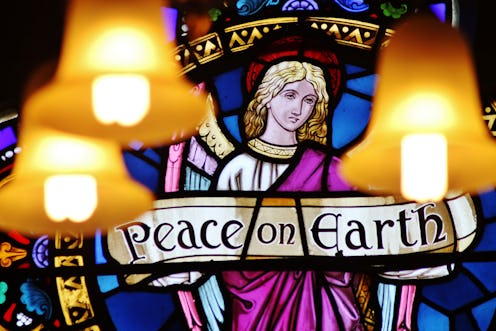News
Why Opposing Gun Control Is Downright Unchristian

Once again, America is reeling after another round of mass shootings. On Wednesday morning, two alleged assailants opened fire at San Bernardino, California's Inland Regional Center, a state-run facility for people with developmental disabilities. Fourteen people were killed, and 17 people were injured. The suspects, Syed Farook and Tashfeen Malik, were killed by police. That same day, in Savannah, Georgia, one woman was killed and three men were injured when an unidentified gunman went on a rampage. The motive is unknown in both instances. Though 337 days have passed in 2015, America has experienced 355 mass shootings in that time.
Last week, after a gunman opened fire in a Colorado Springs, Colorado, Planned Parenthood, President Obama said that mass shootings can't "become normal" for Americans. What has certainly become routine, however, is the political response to such tragedies. After Tucson and Newtown and Aurora, politicians offered prayers to the grieving families, some attempted to pass gun legislation, and many cowered when the National Rifle Association (NRA) opposed their efforts.
On Wednesday, as if on cue, multiple politicians, including presidential candidates like Jeb Bush and Ben Carson, offered condolences and prayers to those who've lost their lives and all who are mourning them. Yet, none of those politicians are in favor of enacting comprehensive gun control legislation that could prevent potential mass shooters from accessing firearms. As a Christian, this sickens me.
Christians, especially those with legislative authority, must support gun control legislation. Jesus Christ, a radical who died at the age of 33 at the hands of state-sanctioned violence, would certainly agree.
The New York Daily News captured this perpetual cycle of inaction with their Thursday cover, which caused quite the stir. In bold, white print, the New York Daily News' cover blares, "God Isn't Fixing This."
I believe this cover is correct — and my sentiment isn't offered from a place of non-belief. Prayer, as taught to me in the pews of the Baptist church, is a communing with God. It is a means of seeking solace in times of strife and a way of offering thanks for blessings. After mass shootings, people of faith are accustomed to asking God for comfort and understanding through prayer. As Bustle's Melissah Yang writes, "prayer is not meaningless." However, prayer is not — and has never been — a substitute for action.
Chapter two of the book of James reads, "what good is it, my brothers, if someone says he has faith but does not have works? Can that faith save him?"
It is unfathomable for a Christian to advocate for life, but not support measures that could save the lives of those who are most vulnerable. When worshipers aren't safe from harm in the house of the Lord, as evidenced in the Charleston, South Carolina, church shootings that left nine dead, it's clear that gun legislation is an issue that requires attention from religious and political figures alike. When 20 first graders are mowed down in their Newtown, Connecticut, classroom, Christians, especially those with legislative authority, must support gun control legislation.
Jesus Christ, a radical who died at the age of 33 at the hands of state-sanctioned violence, would certainly agree. In fact, Christ said, "the law was made for man and not man for the law," which means mending the law to protect life is downright Christian. People of color, children, and abused spouses are most at-risk of being on the receiving end of a bullet. Given that Christianity preaches to believers like me that it is our moral obligation to protect the oppressed, the destitute, and the weak, passing gun legislation aligns with Christian values.
When politicians like Rand Paul and Ben Carson offer condolences but don't support gun control legislation, it reinforces the idea that gun violence in schools, movie theaters, Planned Parenthood clinics, churches, and centers for people with disabilities are occurrences that can't be stopped without the will of God. This warped thinking misuses religion for political gain.
One of the most significant lessons offered in the Bible is the idea that faith without works is dead. Chapter two of the book of James reads, "What good is it, my brothers, if someone says he has faith but does not have works? Can that faith save him? If a brother or sister is poorly clothed and lacking in daily food, and one of you says to them, 'Go in peace, be warmed and filled,' without giving them the things needed for the body, what good is that? So also faith by itself, if it does not have works, is dead."
Telling constituents that their losses are tragic, without passing substantive legislation to prevent the next mass shooting, is the essence of having faith without works. It is the antithesis of Christian principle.
Image: Charles Clegg/Flickr